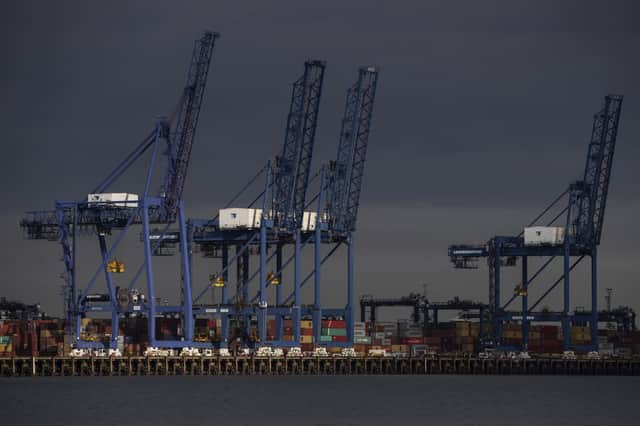Budget 2021: Government in discussions with Rishi Sunak over creation of Scottish freeport


Mr Sunak announced the eight locations in England where freeports will be created – as he revealed that he is talking to both the Scottish and Welsh devolved administrations about the remaining two.
Holyrood transport secretary Ivan McKee is in talks with the UK Government over plans for a “green port”, which would see the UK Government’s freeport proposals adapted to focus on inclusive growth, fair work practices and delivering a net zero economy.
Advertisement
Hide AdAdvertisement
Hide AdMcKee said that there were “concerns about deregulation and risks of criminality, tax evasion and reductions in workers’ rights raised” and said instead, that the Scottish Government would “take the freeport model and apply Scotland’s priorities to it”.
With a total of ten freeports pledged to be created in the Conservative Party 2019 manifesto, Rishi Sunak announced that East Midlands Airport, Felixstowe and Harwich, the Humber region, the Liverpool City Region, Plymouth, Solent, Thames and Teesside are all set to benefit from the post-Brexit status.
Mr Sunak said the special economic zones would come with simpler planning, cheaper customs - with favourable tariffs, VAT or duties - and lower taxes, with "tax breaks to encourage construction, private investment and job creation".
Chief Secretary to the Treasury Stephen Barclay, quizzed about freeports by MPs last month, said he had expected the locations to be announced in "the spring", with the first freeports "ideally ... operational by the end of the year".
The freeport model works by allowing companies to import goods tariff-free and only paying once it is sold into the domestic market, or exporting the final goods without paying UK tariffs.
Mr Sunak said: “Freeports are special economic zones with different rules to make it easier and cheaper to do business. They’re well established internationally, but we’re taking a unique approach.
“Our freeports will have simpler planning to allow businesses to build, infrastructure funding to improve transport links, cheaper customs with favourable tariffs, VAT or duties, and lower taxes, with tax breaks to encourage construction, private investment and job creation.”
He added: "Freeports will be a truly UK-wide policy and we will work constructively with the Scottish, Welsh and Northern Irish administrations.”
Advertisement
Hide AdAdvertisement
Hide AdIn 2016, Mr Sunak - before he was given a ministerial role - authored a paper for the pro-free market think tank Centre for Policy Studies calling for freeports to be set up once the UK had left the European Union.
A Scottish Government spokesperson said: “Earlier this week, Trade Minister Ivan McKee called on the UK Government to support two green ports in Scotland and to ensure each has access to the same level of set-up funding as freeports in England.
“Scotland’s green port model will adapt the UK government’s freeport proposals, with operators and beneficiaries required to commit to adopting Fair Work First criteria, including payment of the real living wage, and to implement robust plan to contribute to Scotland’s just transition to net zero.”
“The Scottish Government is ready to move forward to invite prospective bids for green ports but is awaiting confirmation on funding and governance from the UK government.”